Recruiters only spend about seven seconds scanning each CV. So, if you’re on the lookout for a new job, knowing how to write a CV is a must.
In those initial seven seconds, your CV needs to stand out and grab the recruiters’ attention.
Your CV isn’t merely a snapshot of your professional journey — it is an opportunity to explain why you’re the right fit for the job and what sets you apart from other candidates.
This article breaks down what a CV is, how to write one and includes practical examples to help you out.
What Is a CV?
A Curriculum Vitae (CV) is a document that provides an extensive overview of an individual's academic and professional achievements, qualifications, skills and experiences.
CV vs. Resume: What’s the Difference?
In Europe, the terms "CV" and "resume" are used interchangeably — they refer to the same document.
However, in the U.S., there is a clear difference between a resume and a CV.
A resume is a concise, one-page summary tailored for job applications, emphasizing relevant work experience and skills specific to the position applied for.
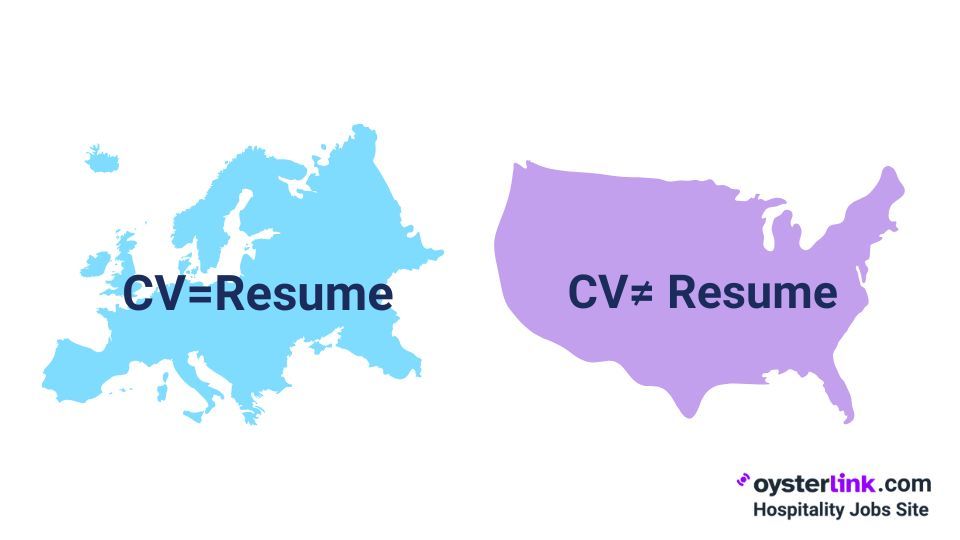
On the other hand, a CV, or Curriculum Vitae, is a more extensive document often used in academia.
It serves as a comprehensive academic diary, encompassing not only work experience but also publications, research projects, awards and more.
CVs are most commonly used when applying for academic and non-academic positions in higher education, science, research and health care.
They are also used to seek a fellowship or grant and are expected for some positions overseas.
7 Tips on How To Write a CV That Sets You Apart
When crafting your CV, your aim is to produce a document that not only grabs the reader's attention but also forges a connection with your prospective employer.
Here are some key tips to follow to ensure your CV stands out.
1. Eliminate errors
Ensure the impeccable quality of your CV by diligently checking for spelling and grammar mistakes.
Utilize spell-check tools and, for an added layer of scrutiny, enlist a second pair of eyes to conduct thorough proofreading.
A polished CV not only reflects your attention to detail but also communicates a high level of professionalism.
2. Use active language and list concrete achievements
Enhance your CV by starting bullet points with strong action verbs such as "Developed," "Implemented" or "Achieved."
This makes your responsibilities and achievements stand out.
Additionally, incorporate industry-specific keywords relevant to the job you're applying for. This not only captures the attention of recruiters but also ensures compatibility with ATS software, as mentioned above.
Take the opportunity to provide concrete examples of your achievements, emphasizing tangible outcomes and contributions that showcase your professional prowess.
3. Tailor your CV
Conduct comprehensive research on the company's website and social media presence to gain insights into its values and priorities.
Tailor your CV for each application by aligning it with the specific role and requirements of the prospective employer, showcasing a thoughtful and customized approach.
According to research, 63% of recruiters say that the biggest mistake job seekers make on their CVs is neglecting to tailor them to the specific job they are applying for.
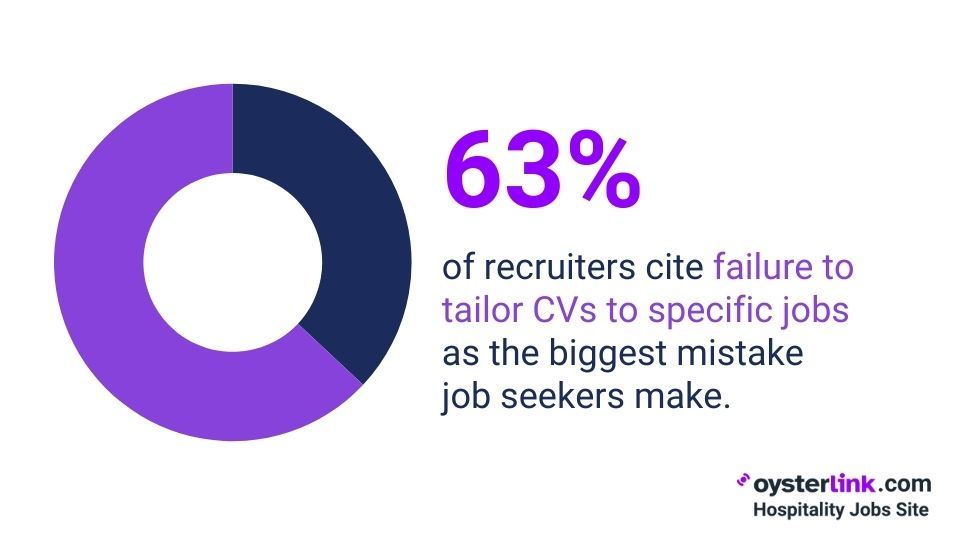
Tailoring your CV to the job you're applying for is essential for highlighting relevant skills and experiences.
It demonstrates genuine interest, showcases a clear understanding of the role and stands out among other applications, increasing your chances of securing an interview.
4. Choose the right CV style
Evaluate your industry and target audience to determine the most suitable CV style. In traditional sectors like legal or finance, opt for a classic, formal CV style.
Alternatively, in creative or tech-driven industries, consider adopting modern and innovative design elements to showcase adaptability and creativity.
5. Be honest
Resist any temptation to exaggerate or lie on your CV. Honesty is a fundamental element in establishing trust with potential employers.
Understand the potential consequences of dishonesty, including the legal implications of degree fraud.
[Source: Statista]
6. Stay relevant
Prioritize relevance over volume in your CV. Keep it concise, focusing on pertinent information directly related to the job you're applying for.
Highlight your most relevant skills, experiences and accomplishments to capture the employer's interest swiftly and effectively.
7. Protect personal information
Exercise caution when posting your CV online by avoiding putting your home address.
This precautionary measure helps safeguard against potential fraud. Prioritize personal safety while maintaining a polished and professional online presence.
How To Format a CV for Maximum Impact
When it comes to formatting your CV, strategic choices can make a significant difference in how it is received by potential employers.
Here are 10 essential tips to ensure your CV stands out in a professional and well-organized manner:
- Use your name as the title: Instead of using generic titles like 'Curriculum Vitae' or 'CV,' let your name serve as the title. This not only saves valuable space but also puts a direct focus on your identity.
- Use section headings: Section headings are perfect for breaking up your CV and enhancing readability. Make them larger (font size 14 or 16), bold and consistent throughout the document
- Choose professional fonts: Opt for clear, legible fonts such as Arial, Calibri or Times New Roman. Avoid fonts like Comic Sans because they’re perceived as informal and may be hard to read.
- Ensure layout consistency: Maintain consistency in your CV layout. Make sure the formatting remains the same across all sections, creating a cohesive and professional look.
- Avoid the use of unnecessary graphics and photos: Omit unnecessary graphics and photos in your CV to uphold a professional document. Their inclusion may divert attention from essential content, increase file size and introduce the possibility of biased judgments based on appearance rather than qualifications.
- Embrace white space: Incorporate white space strategically to enhance readability. Avoid cramming information and allow for a balanced, uncluttered layout.
- Double-check margins: Ensure proper margins (2.5 centimeters) around your CV to maintain a clean and professional appearance. Avoid the temptation to reduce margins to fit more content.
- Use bullet points: Keep your CV concise by using bullet points. This layout allows potential employers to quickly skim through your CV and extract essential information. Focus on key achievements and responsibilities in a streamlined manner,
- Save as PDF: Save your CV as a PDF to preserve formatting consistency. This ensures that potential employers can open and read your CV without the risk of formatting changes. Unless specified otherwise in the job advert, a PDF format is universally accepted.
- Pay attention to document naming: Avoid generic names like “Doc1.” Instead, use a title that identifies you, such as “Name-CV.”
What Are the 3 Main Types of CVs?
Before writing a CV, you need to decide on the most fitting structure that aligns with your career goals and effectively highlights your qualifications.
Three main types of CVs — chronological, functional and combination or hybrid — offer distinct approaches to presenting your professional journey.
1. Chronological CV
This CV type lists work experiences in reverse chronological order, starting with the most recent position. It's a simple format that highlights the candidate's career progression.
Most employers and recruiters prefer this format since it is easy to read and effective in emphasizing your stability and professional growth.
2. Functional CV
Focusing on skills and qualifications rather than a strict chronological order of work history, the functional CV is used to emphasize specific abilities and achievements.
It is particularly useful for individuals with employment gaps or those changing careers.
3. Combination or Hybrid CV
As the name suggests, this style combines elements of both chronological and functional CVs. It provides a chronological list of work experiences while also highlighting skills and qualifications.
This format allows candidates to showcase their career trajectory and key competencies simultaneously.
What To Include in a CV?
A good CV should include contact information, a personal profile (CV objection or summary), work experience, education and skills sections.
Here's what your CV should have to stand out.
Contact Information
Your contact details are pivotal for employer outreach, so make sure they’re accurate and complete.
Here’s what to include:
- Name: The preferred format is First name, Last name.
- Phone number: Include a reliable phone number, including the country code if you're applying beyond your home country.
- Email address: Go for a professional email address, consisting of your first name and last name. A professional email address enhances your overall image and underscores your attention to detail.
- Professional title: Clearly define your professional title, aligning it with either your desired job or the specific position you're applying for.
- Location information: If you plan to move, provide details and your expected timeline. If you need relocation support, make that clear.
- Social media handles: Consider including social media handles, particularly those that showcase your professional endeavors. Platforms like LinkedIn can offer additional insights into your professional background and accomplishments.
[Source: Statista]
Personal Profile Statement: CV Objective or CV Summary
A personal profile is a brief, targeted section at the beginning of your CV that provides a snapshot of who you are as a professional.
Whether you choose a CV objective or summary, this crucial introduction demands clarity to swiftly capture the attention of HR recruiters. It is your chance to make a strong first impression.
Let’s examine the key differences between a CV objective and a CV summary to help you decide which one aligns best with your professional background and the specific job you're targeting.
Work experience
Your work experience section is the focal point of your CV, capturing the most attention from HR recruiters and playing a pivotal role in the hiring decision.
When detailing your work experience, focus on quantifiable achievements to showcase the impact you've made in previous roles.
For example, instead of stating "Managed a team," say "Led a team of 10, increasing sales by 20% over six months." This provides concrete evidence of your contributions and abilities.
In a recent survey, recruiters identified years of experience (84%) and the type of experience (83%) as the key factors influencing their initial review of candidates.
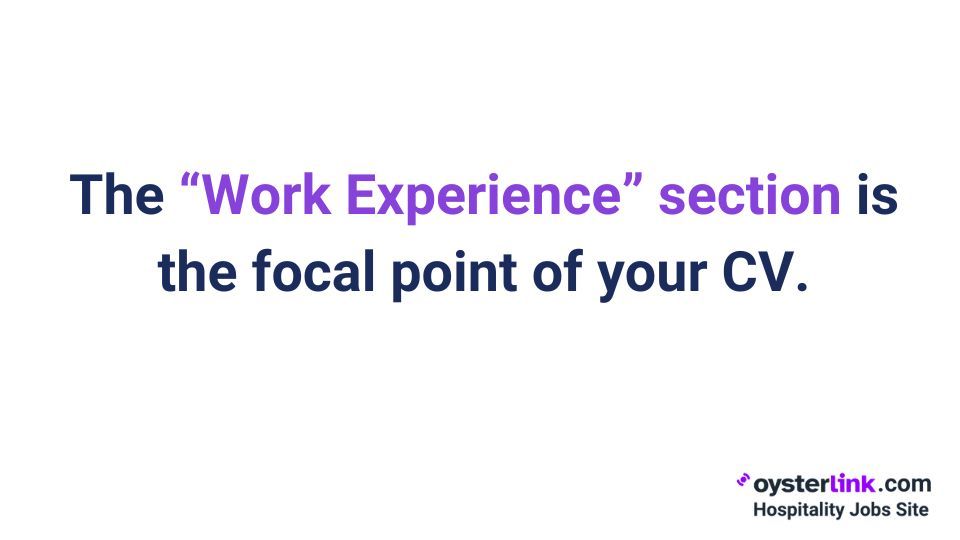
Here is the information you should use to describe your work experience:
- Position/job title
- Company name, location, description
- Date of employment
- Responsibilities and achievements
Keep in mind that crafting this section requires more than just listing responsibilities — you need to emphasize your achievements and accomplishments to showcase how you contributed to the company's growth and success.
Here’s an example:
Senior Marketing Manager
ABC Marketing Solutions, New York, NY
January 2018–Present
- Led a dynamic team in executing comprehensive marketing strategies, resulting in a 20% increase in customer engagement
- Launched innovative social media campaigns that contributed to a 15% growth in online brand presence
- Managed key client relationships, leading to a 30% increase in business partnerships
Education
In this section of your CV, you need to outline your educational journey, focusing on the most relevant qualifications for the position you're applying for.
Include the following details:
- Degrees earned: List the degrees you've obtained, such as Bachelor's, Master's or Ph.D., in reverse chronological order.
- Institution and location: Mention the names of the educational institutions where you earned your degrees and their locations.
- Dates attended: Specify the duration of your studies, including start and end dates or expected graduation dates.
- Relevant coursework, achievements, honors, GPA, etc.: Highlight any specific coursework or notable achievements that are directly related to the job you're applying for.
If you're a recent graduate or lacking extensive work experience, consider including relevant coursework, projects or academic achievements that align with the job requirements.
This provides additional context to your educational background and showcases applicable skills and knowledge.
Here are some examples:
Master of Science in Computer Science
Harvard University, Cambridge, Massachusetts, USA
August 2020–May 2022
Artificial Intelligence, Database Systems Published research on machine learning algorithms for image recognition.
Bachelor of Business Administration (BBA) in Marketing
University of California (UCLA), Los Angeles, California, USA
August 2014–June 2018
Digital Marketing Strategies, Consumer Behavior
GPA: 3.9
East High School, Denver, Colorado, USA
September 2011–May 2015
Graduated with Honors
Note: Place the “education” section above the “work experience” section if you’re lacking work experience. If holding a university degree, exclude high school details.
Skills
Crafting a compelling CV extends beyond merely detailing your work history; it involves showcasing a diverse set of skills that make you a valuable asset in today's job market.
Research indicates that 41% of recruiters prioritize skills when reviewing CVs.
In the current job market, companies increasingly value skills over industry experience, providing highly skilled individuals with the flexibility to explore diverse opportunities and find roles that best match their abilities.
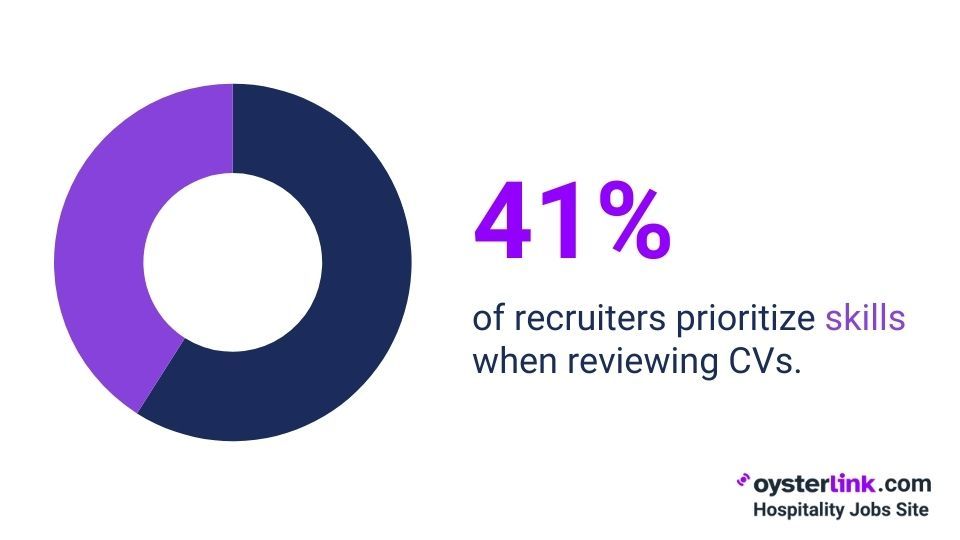
Listing your skills on a CV is a deliberate effort to provide hiring managers with a comprehensive snapshot of your qualifications.
It allows employers to quickly assess your suitability for a role by aligning your expertise with the specific requirements of the position.
There are two types of skills that contribute to a well-rounded professional profile — hard skills and soft skills.
While hard skills are the technical, measurable abilities directly related to your field, soft skills encompass your interpersonal attributes.
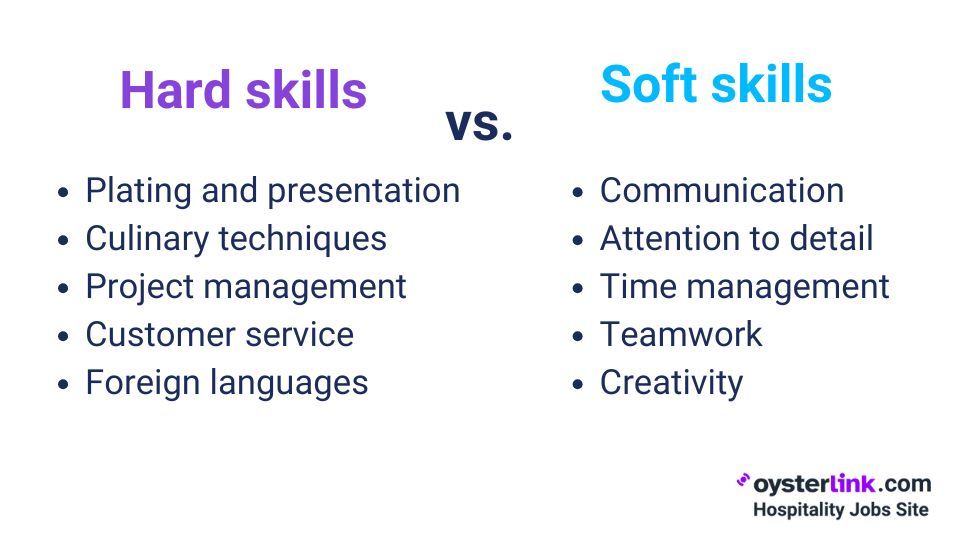
Don’t forget to look at the skills in the job ad and adjust your skill section accordingly.
This approach enhances your suitability for the position and increases the chances of making a positive impact on hiring managers.
Additional CV Sections
While your contact information, personal profile, work experience, education and skills form the core of your CV, including additional sections can provide a more comprehensive view of your professional profile.
Consider incorporating the following sections to enhance your CV:
- Certifications: Highlight relevant certifications to stand out. List credentials that match the role — for example, ServSafe Food Handler or TIPS alcohol training — to show expertise and commitment to professional growth.
- Languages: Showcase your proficiency in languages beyond your native tongue. This is particularly valuable in a globalized job market.
- Professional memberships: Mention any memberships in professional organizations related to your industry. This underscores your engagement and commitment to staying informed about industry trends.
- Publications: If applicable, list any articles, research papers or publications you've authored. This is especially relevant for those in academia or research-oriented roles.
- Conferences and presentations: Highlight conferences attended or presentations delivered. This section emphasizes your active participation in industry events and your ability to share insights.
- Awards and honors: Showcase any professional awards, honors or recognitions you've received. This adds a layer of distinction to your profile.
- Volunteer work: Include a section on volunteer experiences. This not only reflects your commitment to social causes but also demonstrates your interpersonal and community engagement skills.
- Hobbies and interests: While optional, a brief section on hobbies and interests can offer a glimpse into your personality and provide conversation points during interviews.
- Professional development: Detail any workshops, courses or seminars you've attended for continuous professional development. This shows your proactive approach to skill enhancement.
Tailoring Your CV to the Job Description
Customizing your CV for each application is crucial. By aligning your skills and experiences with the specific requirements of the job, you demonstrate to employers that you're a perfect fit for the role.
Start by carefully reading the job description and identifying keywords and phrases. Incorporate these into your CV, particularly in the personal profile, skills and work experience sections.
This approach not only highlights your suitability but also helps your CV pass through Applicant Tracking Systems (ATS) that many companies use to filter candidates.
Best CV Examples
If you're new to crafting CVs and feeling a bit overwhelmed, don't worry. These three great hospitality CV examples are here to inspire you and help you get started.
1. Hotel Manager CV
Here's a simple Hotel Manager CV that you can use.
If you want more specific job descriptions such as Guest Relations Manager or Guest Services Manager, you can find them on our Hotel Manager job description page.
Annie Thompson
Hotel Manager
Email: [email protected] | Phone: +123-456-7890
LinkedIn: linkedin.com/in/jane-thompson123Professional Summary
Dynamic and results-driven Hotel Manager with over 10 years of experience in daily operations, staff leadership, and delivering exceptional guest experiences. Proven success in revenue optimization, cost reduction, and strategic planning.
Work Experience
Hotel Manager
Grand Regency Hotel, New York, NY
March 2018 – Present
- Increased guest satisfaction by 20% through targeted initiatives.
- Implemented cost-saving measures, reducing operational expenses by 10%.
- Exceeded revenue targets by 15% with strategic marketing.
Assistant Hotel Manager
Serene Boutique Inn, San Francisco, CA
October 2017 – February 2018
- Introduced personalized guest services, boosting satisfaction by 15%.
- Reduced operational expenses by 8% through cost-saving efforts.
- Contributed to a 12% revenue increase by coordinating with the marketing team.
Front Office Manager
Oceanfront Resort & Spa, Miami, FL
May 2015 – August 2017
- Achieved a 95% guest satisfaction rate through efficient front office operations.
- Streamlined processes, improving efficiency by 15%.
Education
Bachelor of Science in Hospitality Management
Grandview University | Graduated: 2012Relevant Skills
- Staff leadership
- Budget management
- Guest relations
- Revenue optimization
- Strategic planning
- Team building
Professional Memberships
- American Hotel and Lodging Association (AH&LA)
- International Association of Hotel Managers (IAHM)
- Hospitality Professionals Network (HPN)
2. Executive Chef CV
Here's a sample CV for an Executive Chef, but you can also check out our Executive Chef job description for more information and templates.
Alex Bellini
Executive Chef
Email: [email protected] | Phone: +123-456-7890
LinkedIn: linkedin.com/in/alex-bellini123Summary
Creative and highly skilled Executive Chef with 15+ years of experience delivering culinary excellence. Proven ability to manage kitchen operations, create innovative menus, and maintain high standards of food quality, safety, and cost control.
Work Experience
Executive Chef
Gourmet Bistro, New York, NY
March 2020 – November 2023
- Elevated culinary offerings, increasing restaurant revenue by 25%.
- Ensured strict compliance with health and safety regulations, achieving a consistent 5-star rating.
Head Chef
Culinary Creations, San Francisco, CA
February 2016 – January 2020
- Introduced new menus, increasing customer satisfaction by 20%.
- Reduced food costs by 15% through cost-effective measures.
Sous Chef
Black Rabbit, Chicago, IL
April 2014 – December 2015
- Developed menus focusing on seasonal and local ingredients.
- Streamlined kitchen operations, improving efficiency by 10%.
Education
Bachelor of Science in Management
De Loureigh University | Graduated: 2020 | Cum LaudeRelevant Skills
- Menu development
- Culinary creativity
- Kitchen management
- Food safety and sanitation
- Budgeting and cost control
- Team leadership
Specialized Training
- Certified Executive Chef Program (CEC), Culinary Institute of America, 2020
- Leadership and Management in Hospitality, AHLEI, 2016
- Food Safety and Sanitation Certification, NRA, 2014
3. Event Coordinator CV
This is a great CV if you're looking to get into event management.
We also have an Event Coordinator job description so you can see what a job application will typically look like.
Emily Johnson
Event Coordinator
Email: [email protected] | Phone: +124-476-7690
LinkedIn: linkedin.com/in/emily-johnson123Summary
Detail-oriented and highly organized Event Coordinator with over 8 years of experience in planning and executing weddings, corporate events, and conferences. Proven success in delivering seamless event experiences while exceeding client expectations.
Work Experience
Senior Event Coordinator
Elite Occasions, New York, NY
March 2020 – November 2023
- Organized high-profile corporate events with up to 500 attendees, achieving a 95% satisfaction rate.
- Streamlined event planning processes, increasing efficiency by 20%.
Event Planner
Metro Corporate Events, Los Angeles, CA
January 2018 – January 2020
- Led flawless event execution, driving a 25% increase in annual revenue.
- Negotiated vendor contracts, reducing production costs by 15%.
Wedding Coordinator
Elegance Weddings & More, Chicago, IL
May 2015 – January 2018
- Successfully coordinated weddings with a 90% client satisfaction rate.
- Implemented time-saving planning processes, increasing client capacity.
Education
Bachelor of Arts in Event Management
University of Southern California | Graduated: 2014Relevant Skills
- Event planning and coordination
- Vendor management
- Budgeting and financial management
- Client relationship management
- Attention to detail
- Time management
Certifications
- Certified Special Events Professional (CSEP), ILEA
- Certified Wedding and Event Planner (CWEP), Wedding Planning Institute
You can use these CV templates and modify them for your specific application. Remember that you can also write your own CV from scratch using the tips and tricks you learned in this guide.
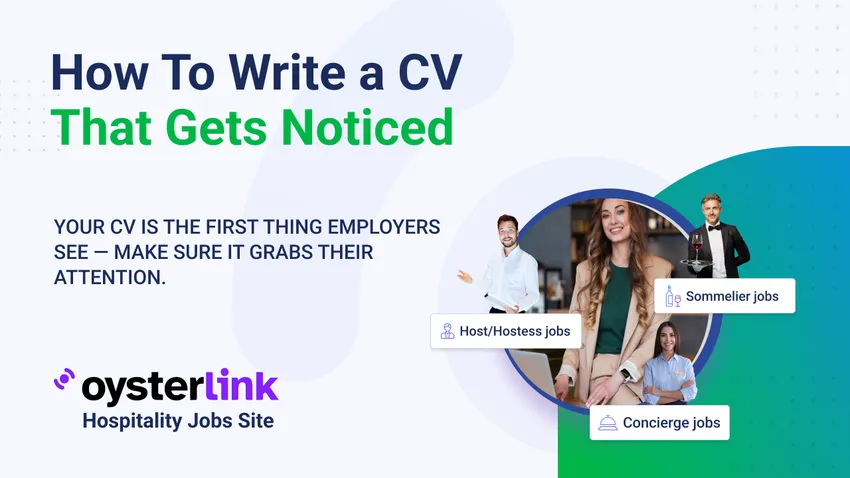



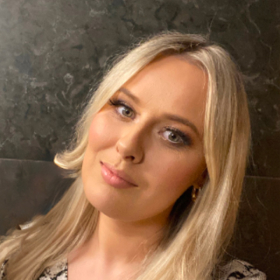





Loading comments...